- Home
- Stephen Crane
The Third Violet Page 4
The Third Violet Read online
Page 4
"George Hollanden," said the voice at his shoulder, "you are not onlydisagreeable, but you are hopelessly ridiculous. I--I wish you wouldnever speak to me again!"
"Oh, come now, Grace, don't--don't---- Look! There's the stage coming,isn't it?"
"No, the stage is not coming. I wish--I wish you were at the bottom ofthe sea, George Hollanden. And--and Mr. Hawker, too. There!"
"Oh, bless my soul! And all about an infernal dog," wailed Hollanden."Look! Honest, now, there's the stage. See it? See it?"
"It isn't there at all," she said.
Gradually he seemed to recover his courage. "What made you sotremendously angry? I don't see why."
After consideration, she said decisively, "Well, because."
"That's why I teased you," he rejoined.
"Well, because--because----"
"Go on," he told her finally. "You are doing very well." He waitedpatiently.
"Well," she said, "it is dreadful to defend somebody so--so excitedly,and then have it turned out just a tease. I don't know what he wouldthink."
"Who would think?"
"Why--he."
"What could he think? Now, what could he think? Why," said Hollanden,waxing eloquent, "he couldn't under any circumstances think--thinkanything at all. Now, could he?"
She made no reply.
"Could he?"
She was apparently reflecting.
"Under any circumstances," persisted Hollanden, "he couldn't thinkanything at all. Now, could he?"
"No," she said.
"Well, why are you angry at me, then?"
CHAPTER XI.
"John," said the old mother, from the profound mufflings of the pillowand quilts.
"What?" said the old man. He was tugging at his right boot, and his tonewas very irascible.
"I think William's changed a good deal."
"Well, what if he has?" replied the father, in another burst ofill-temper. He was then tugging at his left boot.
"Yes, I'm afraid he's changed a good deal," said the muffled voice fromthe bed. "He's got a good many fine friends, now, John--folks what puton a good many airs; and he don't care for his home like he did."
"Oh, well, I don't guess he's changed very much," said the old mancheerfully. He was now free of both boots.
She raised herself on an elbow and looked out with a troubled face."John, I think he likes that girl."
"What girl?" said he.
"What girl? Why, that awful handsome girl you see around--of course."
"Do you think he likes 'er?"
"I'm afraid so--I'm afraid so," murmured the mother mournfully.
"Oh, well," said the old man, without alarm, or grief, or pleasure inhis tone.
He turned the lamp's wick very low and carried the lamp to the head ofthe stairs, where he perched it on the step. When he returned he said,"She's mighty good-look-in'!"
"Well, that ain't everything," she snapped. "How do we know she ain'tproud, and selfish, and--everything?"
"How do you know she is?" returned the old man.
"And she may just be leading him on."
"Do him good, then," said he, with impregnable serenity. "Next timehe'll know better."
"Well, I'm worried about it," she said, as she sank back on the pillowagain. "I think William's changed a good deal. He don't seem to careabout--us--like he did."
"Oh, go to sleep!" said the father drowsily.
She was silent for a time, and then she said, "John?"
"What?"
"Do you think I better speak to him about that girl?"
"No."
She grew silent again, but at last she demanded, "Why not?"
"'Cause it's none of your business. Go to sleep, will you?" Andpresently he did, but the old mother lay blinking wild-eyed into thedarkness.
In the morning Hawker did not appear at the early breakfast, eaten whenthe blue glow of dawn shed its ghostly lights upon the valley. The oldmother placed various dishes on the back part of the stove. At teno'clock he came downstairs. His mother was sweeping busily in theparlour at the time, but she saw him and ran to the back part of thestove. She slid the various dishes on to the table. "Did you oversleep?"she asked.
"Yes. I don't feel very well this morning," he said. He pulled his chairclose to the table and sat there staring.
She renewed her sweeping in the parlour. When she returned he sat stillstaring undeviatingly at nothing.
"Why don't you eat your breakfast?" she said anxiously.
"I tell you, mother, I don't feel very well this morning," he answeredquite sharply.
"Well," she said meekly, "drink some coffee and you'll feel better."
Afterward he took his painting machinery and left the house. His youngersister was at the well. She looked at him with a little smile and alittle sneer. "Going up to the inn this morning?" she said.
"I don't see how that concerns you, Mary?" he rejoined, with dignity.
"Oh, my!" she said airily.
"But since you are so interested, I don't mind telling you that I'm notgoing up to the inn this morning."
His sister fixed him with her eye. "She ain't mad at you, is she, Will?"
"I don't know what you mean, Mary." He glared hatefully at her andstrode away.
Stanley saw him going through the fields and leaped a fence jubilantlyin pursuit. In a wood the light sifted through the foliage and burnedwith a peculiar reddish lustre on the masses of dead leaves. He frownedat it for a while from different points. Presently he erected his easeland began to paint. After a a time he threw down his brush and swore.Stanley, who had been solemnly staring at the scene as if he too wassketching it, looked up in surprise.
In wandering aimlessly through the fields and the forest Hawker oncefound himself near the road to Hemlock Inn. He shied away from itquickly as if it were a great snake.
While most of the family were at supper, Mary, the younger sister, camecharging breathlessly into the kitchen. "Ma--sister," she cried, "I knowwhy--why Will didn't go to the inn to-day. There's another fellow come.Another fellow."
"Who? Where? What do you mean?" exclaimed her mother and her sister.
"Why, another fellow up at the inn," she shouted, triumphant in herinformation. "Another fellow come up on the stage this morning. And shewent out driving with him this afternoon."
"Well," exclaimed her mother and her sister.
"Yep. And he's an awful good-looking fellow, too. And she--oh, my--shelooked as if she thought the world and all of him."
"Well," exclaimed her mother and her sister again.
"Sho!" said the old man. "You wimen leave William alone and quit yourgabbling."
The three women made a combined assault upon him. "Well, we ain'ta-hurting him, are we, pa? You needn't be so snifty. I guess we ain'ta-hurting him much."
"Well," said the old man. And to this argument he added, "Sho!"
They kept him out of the subsequent consultations.
CHAPTER XII.
The next day, as little Roger was going toward the tennis court, a largeorange and white setter ran effusively from around the corner of the innand greeted him. Miss Fanhall, the Worcester girls, Hollanden, andOglethorpe faced to the front like soldiers. Hollanden cried, "Why,Billie Hawker must be coming!" Hawker at that moment appeared, comingtoward them with a smile which was not overconfident.
Little Roger went off to perform some festivities of his own on thebrown carpet under a clump of pines. The dog, to join him, felt obligedto circle widely about the tennis court. He was much afraid of thistennis court, with its tiny round things that sometimes hit him. Whennear it he usually slunk along at a little sheep trot and with an eye ofwariness upon it.
At her first opportunity the younger Worcester girl said, "You didn'tcome up yesterday, Mr. Hawker."
Hollanden seemed to think that Miss Fanhall turned her head as if shewished to hear the explanation of the painter's absence, so he engagedher in swift and fierce conversation.
"No," said Hawker
. "I was resolved to finish a sketch of a stubble fieldwhich I began a good many days ago. You see, I was going to do such agreat lot of work this summer, and I've done hardly a thing. I reallyought to compel myself to do some, you know."
"There," said Hollanden, with a victorious nod, "just what I told you!"
"You didn't tell us anything of the kind," retorted the Worcester girlswith one voice.
A middle-aged woman came upon the porch of the inn, and after scanningfor a moment the group at the tennis court she hurriedly withdrew.Presently she appeared again, accompanied by five more middle-agedwomen. "You see," she said to the others, "it is as I said. He has comeback."
The five surveyed the group at the tennis court, and then said: "So hehas. I knew he would. Well, I declare! Did you ever?" Their voices werepitched at low keys and they moved with care, but their smiles werebroad and full of a strange glee.
"I wonder how he feels," said one in subtle ecstasy.
Another laughed. "You know how you would feel, my dear, if you were himand saw yourself suddenly cut out by a man who was so hopelesslysuperior to you. Why, Oglethorpe's a thousand times better looking. Andthen think of his wealth and social position!"
One whispered dramatically, "They say he never came up here at allyesterday."
Another replied: "No more he did. That's what we've been talking about.Stayed down at the farm all day, poor fellow!"
"Do you really think she cares for Oglethorpe?"
"Care for him? Why, of course she does. Why, when they came up the pathyesterday morning I never saw a girl's face so bright. I asked myhusband how much of the Chambers Street Bank stock Oglethorpe owned, andhe said that if Oglethorpe took his money out there wouldn't be enoughleft to buy a pie."
The youngest woman in the corps said: "Well, I don't care. I think it istoo bad. I don't see anything so much in that Mr. Oglethorpe."
The others at once patronized her. "Oh, you don't, my dear? Well, let metell you that bank stock waves in the air like a banner. You would seeit if you were her."
"Well, she don't have to care for his money."
"Oh, no, of course she don't have to. But they are just the ones thatdo, my dear. They are just the ones that do."
"Well, it's a shame."
"Oh, of course it's a shame."
The woman who had assembled the corps said to one at her side: "Oh, thecommonest kind of people, my dear, the commonest kind. The father is aregular farmer, you know. He drives oxen. Such language! You can reallyhear him miles away bellowing at those oxen. And the girls are shy,half-wild things--oh, you have no idea! I saw one of them yesterday whenwe were out driving. She dodged as we came along, for I suppose she wasashamed of her frock, poor child! And the mother--well, I wish youcould see her! A little, old, dried-up thing. We saw her carrying a pailof water from the well, and, oh, she bent and staggered dreadfully, poorthing!"
"And the gate to their front yard, it has a broken hinge, you know. Ofcourse, that's an awful bad sign. When people let their front gate hangon one hinge you know what that means."
After gazing again at the group at the court, the youngest member of thecorps said, "Well, he's a good tennis player anyhow."
The others smiled indulgently. "Oh, yes, my dear, he's a good tennisplayer."
CHAPTER XIII.
One day Hollanden said, in greeting, to Hawker, "Well, he's gone."
"Who?" asked Hawker.
"Why, Oglethorpe, of course. Who did you think I meant?"
"How did I know?" said Hawker angrily.
"Well," retorted Hollanden, "your chief interest was in his movements, Ithought."
"Why, of course not, hang you! Why should I be interested in hismovements?"
"Well, you weren't, then. Does that suit you?"
After a period of silence Hawker asked, "What did he--what made him go?"
"Who?"
"Why--Oglethorpe."
"How was I to know you meant him? Well, he went because some importantbusiness affairs in New York demanded it, he said; but he is comingback again in a week. They had rather a late interview on the porch lastevening."
"Indeed," said Hawker stiffly.
"Yes, and he went away this morning looking particularly elated. Aren'tyou glad?"
"I don't see how it concerns me," said Hawker, with still greaterstiffness.
In a walk to the lake that afternoon Hawker and Miss Fanhall foundthemselves side by side and silent. The girl contemplated the distantpurple hills as if Hawker were not at her side and silent. Hawkerfrowned at the roadway. Stanley, the setter, scouted the fields in agenial gallop.
At last the girl turned to him. "Seems to me," she said, "seems to meyou are dreadfully quiet this afternoon."
"I am thinking about my wretched field of stubble," he answered, stillfrowning.
Her parasol swung about until the girl was looking up at his inscrutableprofile. "Is it, then, so important that you haven't time to talk tome?" she asked with an air of what might have been timidity.
A smile swept the scowl from his face. "No, indeed," he said, instantly;"nothing is so important as that."
She seemed aggrieved then. "Hum--you didn't look so," she told him.
"Well, I didn't mean to look any other way," he said contritely. "Youknow what a bear I am sometimes. Hollanden says it is a fixed scowl fromtrying to see uproarious pinks, yellows, and blues."
A little brook, a brawling, ruffianly little brook, swaggered from sideto side down the glade, swirling in white leaps over the great darkrocks and shouting challenge to the hillsides. Hollanden and theWorcester girls had halted in a place of ferns and wet moss. Theirvoices could be heard quarrelling above the clamour of the stream.Stanley, the setter, had sousled himself in a pool and then gone androlled in the dust of the road. He blissfully lolled there, with hiscoat now resembling an old door mat.
"Don't you think Jem is a wonderfully good fellow?" said the girl to thepainter.
"Why, yes, of course," said Hawker.
"Well, he is," she retorted, suddenly defensive.
"Of course," he repeated loudly.
She said, "Well, I don't think you like him as well as I like him."
"Certainly not," said Hawker.
"You don't?" She looked at him in a kind of astonishment.
"Certainly not," said Hawker again, and very irritably. "How in the wideworld do you expect me to like him as well as you like him?"
"I don't mean as well," she explained.
"Oh!" said Hawker.
"But I mean you don't like him the way I do at all--the way I expectedyou to like him. I thought men of a certain pattern always fancied theirkind of men wherever they met them, don't you know? And I was so sureyou and Jem would be friends."
"Oh!" cried Hawker. Presently he added, "But he isn't my kind of a manat all."
"He is. Jem is one of the best fellows in the world."
Again Hawker cried "Oh!"
They paused and looked down at the brook. Stanley sprawled panting inthe dust and watched them. Hawker leaned against a hemlock. He sighedand frowned, and then finally coughed with great resolution. "I suppose,of course, that I am unjust to him. I care for you myself, youunderstand, and so it becomes----"
He paused for a moment because he heard a rustling of her skirts as ifshe had moved suddenly. Then he continued: "And so it becomes difficultfor me to be fair to him. I am not able to see him with a true eye." Hebitterly addressed the trees on the opposite side of the glen. "Oh, Icare for you, of course. You might have expected it." He turned from thetrees and strode toward the roadway. The uninformed and disreputableStanley arose and wagged his tail.
As if the girl had cried out at a calamity, Hawker said again, "Well,you might have expected it."
CHAPTER XIV.
At the lake, Hollanden went pickerel fishing, lost his hook in a gaunt,gray stump, and earned much distinction by his skill in discoveringwords to express his emotion without resorting to the list ordinarilyused in such cases. The younger
Miss Worcester ruined a new pair ofboots, and Stanley sat on the bank and howled the song of the forsaken.At the conclusion of the festivities Hollanden said, "Billie, you oughtto take the boat back."
"Why had I? You borrowed it."
"Well, I borrowed it and it was a lot of trouble, and now you ought totake it back."
Ultimately Hawker said, "Oh, let's both go!"
On this journey Hawker made a long speech to his friend, and at the endof it he exclaimed: "And now do you think she cares so much forOglethorpe? Why, she as good as told me that he was only a very greatfriend."
Hollanden wagged his head dubiously. "What a woman says doesn't amountto shucks. It's the way she says it--that's what counts. Besides," hecried in a brilliant afterthought, "she wouldn't tell you, anyhow, youfool!"
"You're an encouraging brute," said Hawker, with a rueful grin.
Later the Worcester girls seized upon Hollanden and piled him high withferns and mosses. They dragged the long gray lichens from the chins ofvenerable pines, and ran with them to Hollanden, and dashed them intohis arms. "Oh, hurry up, Hollie!" they cried, because with his greatload he frequently fell behind them in the march. He once positivelyrefused to carry these things another step. Some distance farther on theroad he positively refused to carry this old truck another step. Whenalmost to the inn he positively refused to carry this senseless rubbishanother step. The Worcester girls had such vivid contempt for hisexpressed unwillingness that they neglected to tell him of anyappreciation they might have had for his noble struggle.

 The Complete Short Stories and Sketches of Stephen Crane
The Complete Short Stories and Sketches of Stephen Crane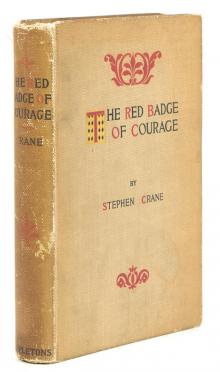 The Red Badge of Courage: An Episode of the American Civil War
The Red Badge of Courage: An Episode of the American Civil War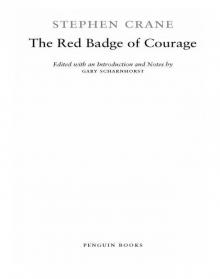 The Red Badge of Courage
The Red Badge of Courage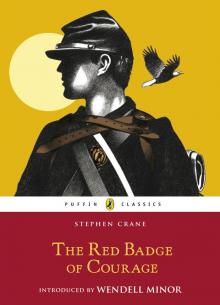 The Red Badge of Courage by Stephen Crane
The Red Badge of Courage by Stephen Crane Maggie, a Girl of the Streets and Other New York Writings
Maggie, a Girl of the Streets and Other New York Writings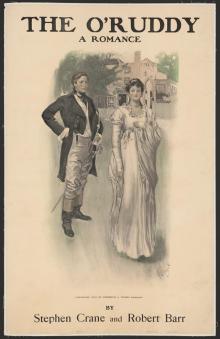 The O'Ruddy: A Romance
The O'Ruddy: A Romance The Third Violet
The Third Violet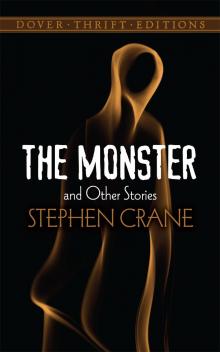 The Monster and Other Stories
The Monster and Other Stories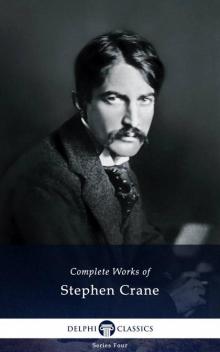 Complete Works of Stephen Crane
Complete Works of Stephen Crane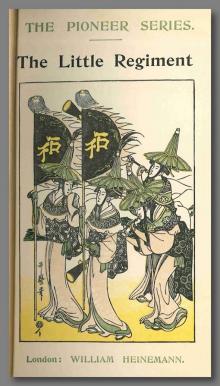 The Little Regiment, and Other Episodes of the American Civil War
The Little Regiment, and Other Episodes of the American Civil War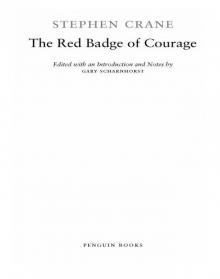 The Red Badge of Courage and Other Stories
The Red Badge of Courage and Other Stories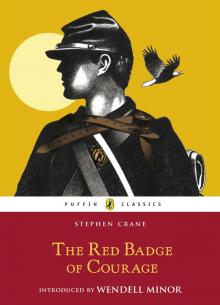 Red Badge of Courage (Puffin Classics Relaunch)
Red Badge of Courage (Puffin Classics Relaunch) The Fight: Whilomville Stories: XI.
The Fight: Whilomville Stories: XI. A Man and Some Others.
A Man and Some Others. The Monster
The Monster